Unit 5Love Mother Nature! 第6课时 Oral Communication 课件(共23张PPT,内嵌音频)
文档属性
| 名称 | Unit 5Love Mother Nature! 第6课时 Oral Communication 课件(共23张PPT,内嵌音频) | 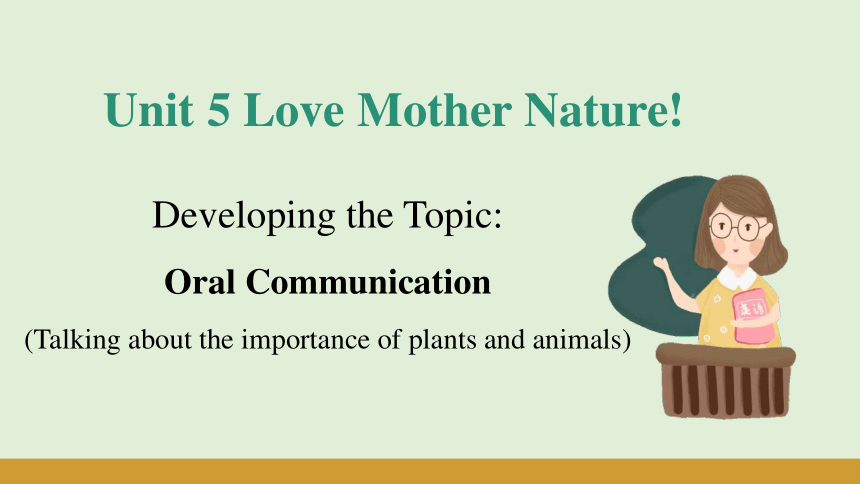 | |
| 格式 | pptx | ||
| 文件大小 | 57.2MB | ||
| 资源类型 | 教案 | ||
| 版本资源 | 仁爱科普版 | ||
| 科目 | 英语 | ||
| 更新时间 | 2024-10-15 08:22:19 | ||
图片预览

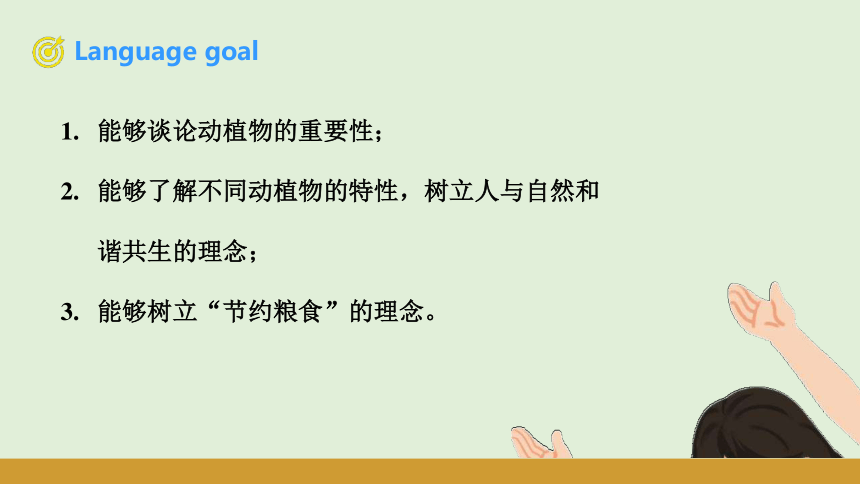
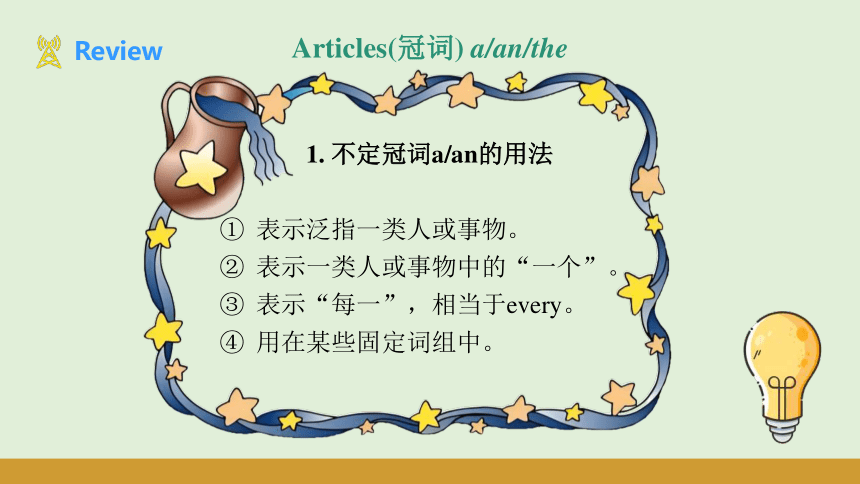
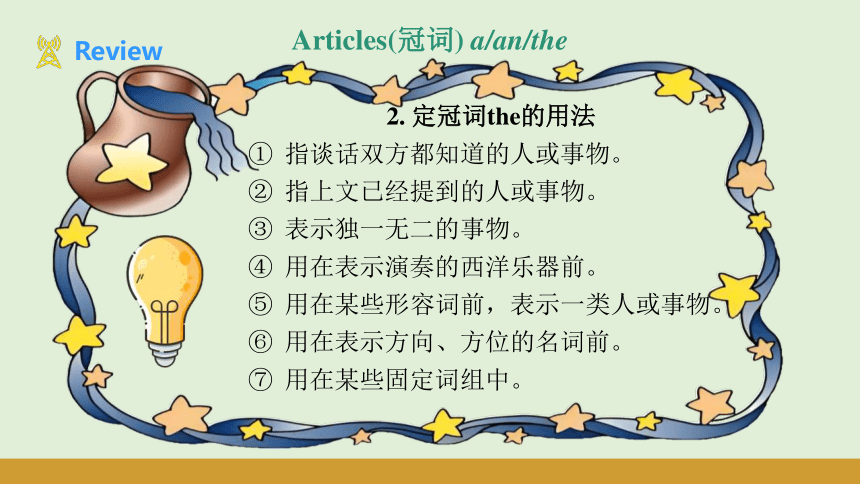
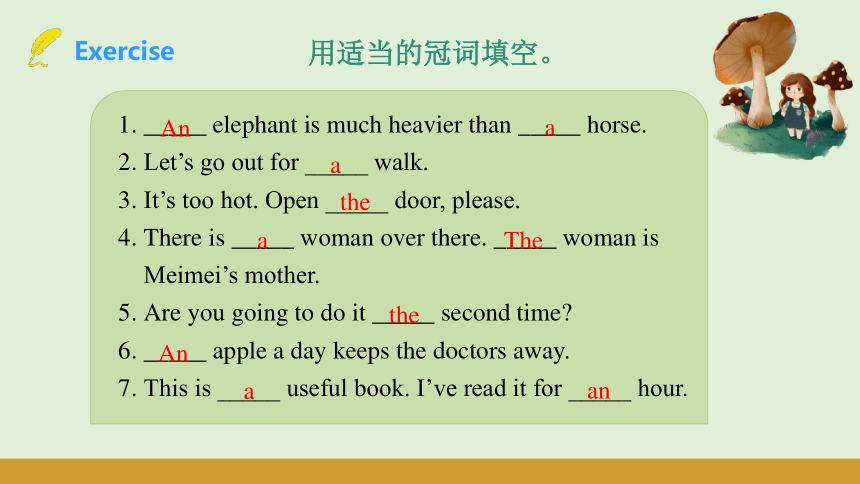
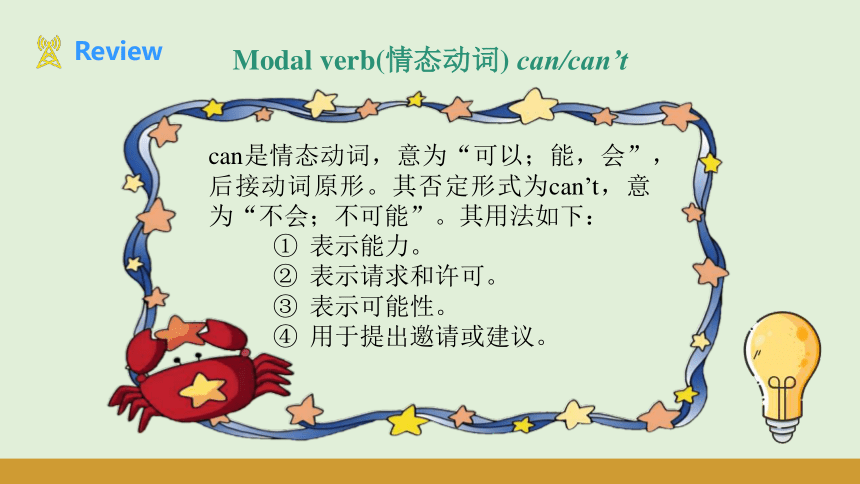
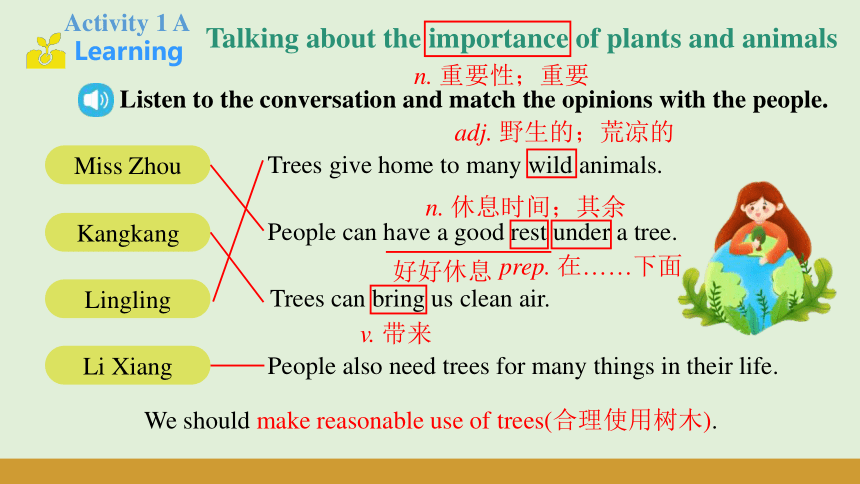
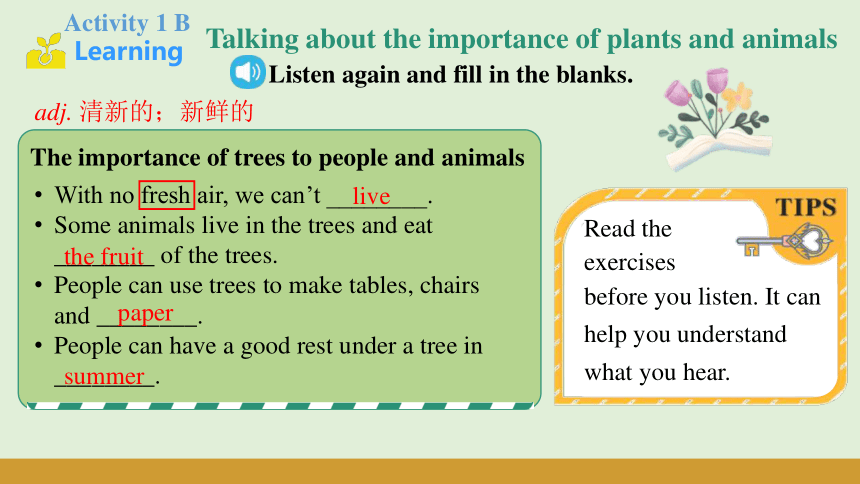
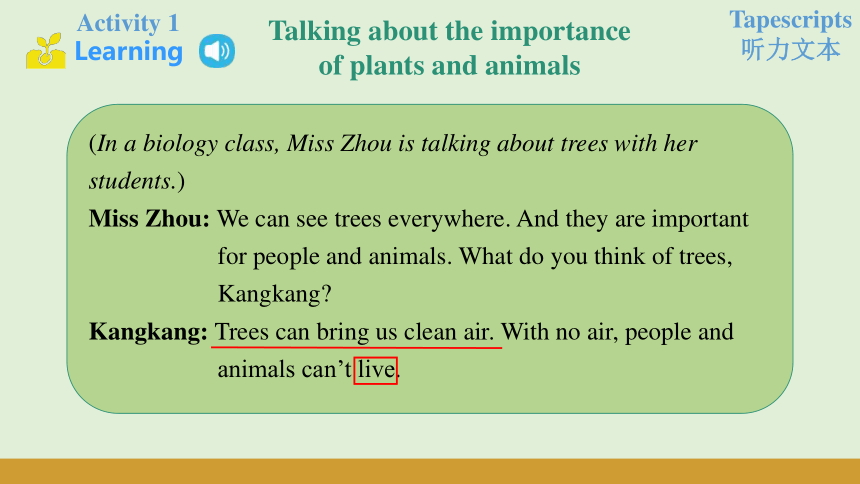
文档简介
(共23张PPT)
Developing the Topic:
Oral Communication
(Talking about the importance of plants and animals)
Unit 5 Love Mother Nature!
能够谈论动植物的重要性;
能够了解不同动植物的特性,树立人与自然和谐共生的理念;
能够树立“节约粮食”的理念。
Articles(冠词) a/an/the
1. 不定冠词a/an的用法
表示泛指一类人或事物。
表示一类人或事物中的“一个”。
表示“每一”,相当于every。
用在某些固定词组中。
2. 定冠词the的用法
指谈话双方都知道的人或事物。
指上文已经提到的人或事物。
表示独一无二的事物。
用在表示演奏的西洋乐器前。
用在某些形容词前,表示一类人或事物。
用在表示方向、方位的名词前。
用在某些固定词组中。
Articles(冠词) a/an/the
用适当的冠词填空。
_____ elephant is much heavier than _____ horse.
Let’s go out for _____ walk.
It’s too hot. Open _____ door, please.
There is _____ woman over there. _____ woman is Meimei’s mother.
Are you going to do it _____ second time
_____ apple a day keeps the doctors away.
This is _____ useful book. I’ve read it for _____ hour.
An
a
a
the
a
The
the
An
a
an
Modal verb(情态动词) can/can’t
can是情态动词,意为“可以;能,会”,后接动词原形。其否定形式为can’t,意为“不会;不可能”。其用法如下:
表示能力。
表示请求和许可。
表示可能性。
用于提出邀请或建议。
Listen to the conversation and match the opinions with the people.
Miss Zhou
Kangkang
Lingling
Li Xiang
Trees give home to many wild animals.
People can have a good rest under a tree.
Trees can bring us clean air.
People also need trees for many things in their life.
Talking about the importance of plants and animals
adj. 野生的;荒凉的
n. 休息时间;其余
prep. 在……下面
好好休息
v. 带来
n. 重要性;重要
Activity 1 A
We should make reasonable use of trees(合理使用树木).
Activity 1 B
Listen again and fill in the blanks.
Read the
exercises
before you listen. It can
help you understand
what you hear.
Talking about the importance of plants and animals
The importance of trees to people and animals
With no fresh air, we can’t ________.
Some animals live in the trees and eat ________ of the trees.
People can use trees to make tables, chairs and ________.
People can have a good rest under a tree in ________.
live
the fruit
paper
summer
adj. 清新的;新鲜的
Activity 1
Tapescripts听力文本
Talking about the importance of plants and animals
(In a biology class, Miss Zhou is talking about trees with her students.)
Miss Zhou: We can see trees everywhere. And they are important for people and animals. What do you think of trees, Kangkang
Kangkang: Trees can bring us clean air. With no air, people and animals can’t live.
Activity 1
Tapescripts听力文本
Talking about the importance of plants and animals
Miss Zhou: Great! What about you, Lingling
Lingling: Trees can give home to many wild animals. Some wild animals can live in the trees and eat the fruit of the trees.
Miss Zhou: What about you, Li Xiang
Li Xiang: Em ... People also need trees for many things in their life. People can use trees to make tables, chairs and paper. Trees are useful to all of us.
Miss Zhou: And don’t forget we can also have a good rest under a tree in summer.
Activity 2
Discuss the importance of animals and plants. The following pictures and questions may help you.
Talking about the importance of plants and animals
What animals and plants do you think are important to us
Why are they important
How do they help us in our everyday life
Cows are important. They give us milk. Many people drink milk every day and it’s good for
our health ...
You may begin like this:
n. (牛或羊等的)奶
给我们牛奶
对我们很重要
Tomatoes are important. They give us vitamins(维生素). Many people like eat scrambled eggs with tomatoes(番茄炒蛋) and it’s very delicious and nutritious(美味又营养的).
Activity 2
Talking about the importance of plants and animals
Chickens are important. They give us eggs and their meat. Many people like drink chicken soup to supplement energy(补充能量). Drinking chicken soup can also dispel coldness(驱寒) and it’s good for our health.
Examples
We should save food(节约粮食) in our everyday life.
单词 词性 释义
wild adj. 野生的;荒凉的
rest n. 休息时间;其余
*under prep. 在……下面
*bring v. 带来
New words
单词 词性 释义
importance n. 重要性;重要
fresh adj. 清新的;新鲜的
everyday adj. 每天的;日常的
*milk n. (牛或羊等的)奶
New phrases
短语 释义
give sth. to sb./
give sb. sth. 把某物给某人
have a rest 休息一会儿
be important to sb. 对某人很重要
The importance of cows in human(人类) life
1. Believe it or not, tomatoes aren’t always red. They can be yellow, pink, purple, black and even white!
信不信由你,西红柿并不总是红色的。它们可以是黄色、粉红色、紫色、黑色甚至白色!
2. Found at Walt Disney World Resort, Florida, USA, the largest single tomato plant in the world covers an area of 56.73 metres sq. That’s bigger than an Olympic size swimming pool!
在美国佛罗里达州的华特迪士尼世界度假区发现了世界上最大的番茄植物,占地56.73平方米,比奥运会标准游泳池还大!
3. It’s thought that tomatoes originally came from Peru.
人们认为西红柿最初来自秘鲁。
10 top tomato facts
How much do you know about the fruit
4. Did you know Heinz Tomato Ketchup has a speed limit If the yummy sauce pours at more than 0.028mph when it’s in the Heinz Tomato Ketchup factory, it’s considered too runny and rejected!
你知道亨氏番茄番茄酱有限速吗?如果美味的酱汁在亨氏番茄番茄酱工厂以超过0.028英里/小时的速度倾倒,则被认为太稀而被拒收!
5. La Tomatina is an annual festival in Spain, where people throw 150,000 tomatoes at each other. Sounds messy!
西红柿大战是西班牙的一个年度节日,人们互相扔15万个西红柿。听起来很乱!
10 top tomato facts
6. The largest ever tomato on record was picked in Oklahoma, USA, in 1986. It weighed over 3.5kg – that’s more than the average UK newborn baby!
有记录以来最大的番茄是1986年在美国俄克拉荷马州采摘的。它的体重超过3.5公斤,超过了英国新生儿的平均体重!
7. In Ohio, USA, they love tomatoes so much that tomato juice is the official state drink!
在美国俄亥俄州,人们非常喜欢西红柿,番茄汁是官方的州饮料!
8. There are around 10,000 varieties of tomatoes worldwide!
全世界大约有10000种西红柿!
10 top tomato facts
9. The first tomatoes in Europe may originally have been yellow. They were first referred to in writing as “pomo d’oro”, meaning “golden apple”.
欧洲的第一批西红柿最初可能是黄色的。他们最初在文字中被称为“pomo d’oro”,意思是“金苹果”。
10. Tomato seedlings have been grown in space before!
番茄幼苗以前在太空里种过!
10 top tomato facts
He/The boy is having a (good) rest under a tree now.
Chickens can give us eggs/give eggs to us.
1. _______________________________________________________________
2. _______________________________________________________________
看图写话。
1. have, under, now
2. can, give, us
We learn:
the importance of trees to people and animals.
the importance of some plants and animals, such as cows, tomatoes and chickens.
the concept of saving food.
We can:
make reasonable use of trees.
save food in our everyday life.
1. Talk about one of the plants or animals you like except today we have learned and write down the passage.
2. Finish the exercises.
Thank you!
Developing the Topic:
Oral Communication
(Talking about the importance of plants and animals)
Unit 5 Love Mother Nature!
能够谈论动植物的重要性;
能够了解不同动植物的特性,树立人与自然和谐共生的理念;
能够树立“节约粮食”的理念。
Articles(冠词) a/an/the
1. 不定冠词a/an的用法
表示泛指一类人或事物。
表示一类人或事物中的“一个”。
表示“每一”,相当于every。
用在某些固定词组中。
2. 定冠词the的用法
指谈话双方都知道的人或事物。
指上文已经提到的人或事物。
表示独一无二的事物。
用在表示演奏的西洋乐器前。
用在某些形容词前,表示一类人或事物。
用在表示方向、方位的名词前。
用在某些固定词组中。
Articles(冠词) a/an/the
用适当的冠词填空。
_____ elephant is much heavier than _____ horse.
Let’s go out for _____ walk.
It’s too hot. Open _____ door, please.
There is _____ woman over there. _____ woman is Meimei’s mother.
Are you going to do it _____ second time
_____ apple a day keeps the doctors away.
This is _____ useful book. I’ve read it for _____ hour.
An
a
a
the
a
The
the
An
a
an
Modal verb(情态动词) can/can’t
can是情态动词,意为“可以;能,会”,后接动词原形。其否定形式为can’t,意为“不会;不可能”。其用法如下:
表示能力。
表示请求和许可。
表示可能性。
用于提出邀请或建议。
Listen to the conversation and match the opinions with the people.
Miss Zhou
Kangkang
Lingling
Li Xiang
Trees give home to many wild animals.
People can have a good rest under a tree.
Trees can bring us clean air.
People also need trees for many things in their life.
Talking about the importance of plants and animals
adj. 野生的;荒凉的
n. 休息时间;其余
prep. 在……下面
好好休息
v. 带来
n. 重要性;重要
Activity 1 A
We should make reasonable use of trees(合理使用树木).
Activity 1 B
Listen again and fill in the blanks.
Read the
exercises
before you listen. It can
help you understand
what you hear.
Talking about the importance of plants and animals
The importance of trees to people and animals
With no fresh air, we can’t ________.
Some animals live in the trees and eat ________ of the trees.
People can use trees to make tables, chairs and ________.
People can have a good rest under a tree in ________.
live
the fruit
paper
summer
adj. 清新的;新鲜的
Activity 1
Tapescripts听力文本
Talking about the importance of plants and animals
(In a biology class, Miss Zhou is talking about trees with her students.)
Miss Zhou: We can see trees everywhere. And they are important for people and animals. What do you think of trees, Kangkang
Kangkang: Trees can bring us clean air. With no air, people and animals can’t live.
Activity 1
Tapescripts听力文本
Talking about the importance of plants and animals
Miss Zhou: Great! What about you, Lingling
Lingling: Trees can give home to many wild animals. Some wild animals can live in the trees and eat the fruit of the trees.
Miss Zhou: What about you, Li Xiang
Li Xiang: Em ... People also need trees for many things in their life. People can use trees to make tables, chairs and paper. Trees are useful to all of us.
Miss Zhou: And don’t forget we can also have a good rest under a tree in summer.
Activity 2
Discuss the importance of animals and plants. The following pictures and questions may help you.
Talking about the importance of plants and animals
What animals and plants do you think are important to us
Why are they important
How do they help us in our everyday life
Cows are important. They give us milk. Many people drink milk every day and it’s good for
our health ...
You may begin like this:
n. (牛或羊等的)奶
给我们牛奶
对我们很重要
Tomatoes are important. They give us vitamins(维生素). Many people like eat scrambled eggs with tomatoes(番茄炒蛋) and it’s very delicious and nutritious(美味又营养的).
Activity 2
Talking about the importance of plants and animals
Chickens are important. They give us eggs and their meat. Many people like drink chicken soup to supplement energy(补充能量). Drinking chicken soup can also dispel coldness(驱寒) and it’s good for our health.
Examples
We should save food(节约粮食) in our everyday life.
单词 词性 释义
wild adj. 野生的;荒凉的
rest n. 休息时间;其余
*under prep. 在……下面
*bring v. 带来
New words
单词 词性 释义
importance n. 重要性;重要
fresh adj. 清新的;新鲜的
everyday adj. 每天的;日常的
*milk n. (牛或羊等的)奶
New phrases
短语 释义
give sth. to sb./
give sb. sth. 把某物给某人
have a rest 休息一会儿
be important to sb. 对某人很重要
The importance of cows in human(人类) life
1. Believe it or not, tomatoes aren’t always red. They can be yellow, pink, purple, black and even white!
信不信由你,西红柿并不总是红色的。它们可以是黄色、粉红色、紫色、黑色甚至白色!
2. Found at Walt Disney World Resort, Florida, USA, the largest single tomato plant in the world covers an area of 56.73 metres sq. That’s bigger than an Olympic size swimming pool!
在美国佛罗里达州的华特迪士尼世界度假区发现了世界上最大的番茄植物,占地56.73平方米,比奥运会标准游泳池还大!
3. It’s thought that tomatoes originally came from Peru.
人们认为西红柿最初来自秘鲁。
10 top tomato facts
How much do you know about the fruit
4. Did you know Heinz Tomato Ketchup has a speed limit If the yummy sauce pours at more than 0.028mph when it’s in the Heinz Tomato Ketchup factory, it’s considered too runny and rejected!
你知道亨氏番茄番茄酱有限速吗?如果美味的酱汁在亨氏番茄番茄酱工厂以超过0.028英里/小时的速度倾倒,则被认为太稀而被拒收!
5. La Tomatina is an annual festival in Spain, where people throw 150,000 tomatoes at each other. Sounds messy!
西红柿大战是西班牙的一个年度节日,人们互相扔15万个西红柿。听起来很乱!
10 top tomato facts
6. The largest ever tomato on record was picked in Oklahoma, USA, in 1986. It weighed over 3.5kg – that’s more than the average UK newborn baby!
有记录以来最大的番茄是1986年在美国俄克拉荷马州采摘的。它的体重超过3.5公斤,超过了英国新生儿的平均体重!
7. In Ohio, USA, they love tomatoes so much that tomato juice is the official state drink!
在美国俄亥俄州,人们非常喜欢西红柿,番茄汁是官方的州饮料!
8. There are around 10,000 varieties of tomatoes worldwide!
全世界大约有10000种西红柿!
10 top tomato facts
9. The first tomatoes in Europe may originally have been yellow. They were first referred to in writing as “pomo d’oro”, meaning “golden apple”.
欧洲的第一批西红柿最初可能是黄色的。他们最初在文字中被称为“pomo d’oro”,意思是“金苹果”。
10. Tomato seedlings have been grown in space before!
番茄幼苗以前在太空里种过!
10 top tomato facts
He/The boy is having a (good) rest under a tree now.
Chickens can give us eggs/give eggs to us.
1. _______________________________________________________________
2. _______________________________________________________________
看图写话。
1. have, under, now
2. can, give, us
We learn:
the importance of trees to people and animals.
the importance of some plants and animals, such as cows, tomatoes and chickens.
the concept of saving food.
We can:
make reasonable use of trees.
save food in our everyday life.
1. Talk about one of the plants or animals you like except today we have learned and write down the passage.
2. Finish the exercises.
Thank you!
同课章节目录
